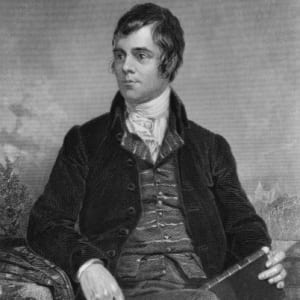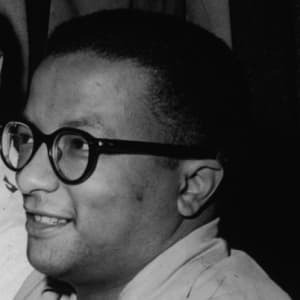
Robert Burns
Poet Robert Burns is considered one of the most famous characters of Scotland’s cultural history. He is best known as a pioneer of the Romantic movement.
Synopsis
Poet Robert Burns began life as a poor tenant farmer but was able to channel his intellectual energy into poetry and song to become one of the most famous characters of Scotland's cultural history. He is best known as a pioneer of the Romantic movement for his lyrical poetry and his rewriting of Scottish folk songs, many of which are still well known across the world today. Since his death on July 21, 1796, his work has inspired many Western thinkers.
Early Life
Born on January 25, 1759, in Alloway, Scotland, Robert Burns was the eldest son of tenant farmers William Burnes and Agnes Broun. After some rudimentary education, Robert’s parents encouraged him to read books by important contemporary writers as well as Shakespeare and Milton.
Since he was a boy, Robert Burns found farm work demanding and detrimental to this health. He broke up the drudgery by writing poetry and engaging with the opposite sex. When his father died in 1784, worn out and bankrupt, it only served to deepen Burns's critical view of the religious and political establishment that perpetuated Scotland's rigid class system.
The Life of a Lover and Writer
In the years 1784 to 1788, Robert Burns engaged in simultaneous illicit relationships that produced several illegitimate children. In 1785, he fathered his first child, Elizabeth, born out of wedlock to his mother’s servant, Elizabeth Paton, while at the same time he was courting Jean Amour. When Jean became pregnant, her father forbade the two to get married, and Jean honored her father’s wishes, at least temporarily. Enraged at Jean's rejection, Burns began wooing Mary Campbell and considered running away with her to the Caribbean. However, Mary suddenly died, changing his plans.
Amidst the domestic chaos in Robert Burns’s life, in July 1786, he published his first major volume of verse, Poems, Chiefly in the Scottish Dialect. Critics praised the work, and its appeal spanned different classes of Scottish society. With this sudden success, Burns decided to stay in Scotland, and that November, he set out for Edinburgh to bask in the glory.
Achievement and Sudden Fame
While in Edinburgh, Robert Burns made many close friends including Agnes “Nancy” McLehose, with whom he exchanged passionate letters, but was unable to consummate the relationship. Frustrated, he began to seduce her servant, Jenny Clow, who bore him a son. Turning to business, Burns befriended James Johnson, a fledgling music publisher, who asked him for help. The result was The Scots Musical Museum, a collection of traditional music of Scotland. Tired of the urban life, Burns settled on a farm at Ellisland in the summer of 1788 and finally married Jean Amour. The couple would ultimately have nine children, only three of whom survived infancy.
In 1791, however, Robert Burns quit farming for good and moved his family to the nearby town of Dumfries. There he accepted the position of excise officer—essentially a tax collector—and continued to write and gather traditional Scottish songs. That year he published “Tam O’Shanter,” a slightly veiled autobiographical story of a ne’er-do-well farmer, which is now considered a masterpiece of narrative poetry. In 1793 he then contributed to publisher George Thomson’s A Select Collection of Original Scottish Airs for the Voice. This work and The Scots Musical Museum make up the bulk of Burns’s poems and folk songs, including the well-known pieces “Auld Lang Syne,” “A Red, Red Rose” and “The Battle of Sherramuir.”
Later Years and Death
In his final three years, Robert Burns sympathized with the French Revolution abroad and radical reform at home, neither of which was popular with many of his neighbors and friends. Never in good health, he had several bouts with illness, possibly attributed to a lifelong heart condition. On the morning of July 21, 1796, Robert Burns died in Dumfries at age 37. The funeral took place on July 25, the same day his son Maxwell was born. A memorial edition of his poems was published to raise money for his wife and children.
Legacy
Robert Burns was a man of great intellect and considered a pioneer of the Romantic movement. Many of the early founders of socialism and liberalism found inspiration in his works. Considered the national poet of Scotland, he is celebrated there and around the world every year on "Burns Night,” January 25.



